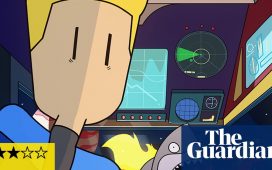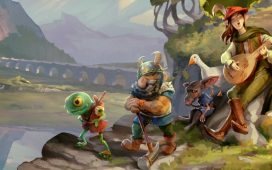Welcome to Pushing Buttons, the Guardian’s gaming newsletter. If you’d like to receive it in your inbox every week, just pop your email in below – and check your inbox (and spam) for the confirmation email.
Sign up for Pushing Buttons, our weekly guide to what’s going on in video games.
Well. There’s only one thing I was going to be talking about in this week’s Pushing Buttons, isn’t there? Since Microsoft very inconsiderately announced the biggest acquisition in gaming history just after last week’s edition went out, the entire games industry has been in a flap. The $69bn deal to buy Call of Duty, World of Warcraft and Overwatch publisher Activision Blizzard absolutely dwarfs the $7.5bn that the house of Xbox paid for Zenimax/Bethesda in 2020, which already had me feeling slightly uneasy about the amount of cash being thrown around by giant corporations (see also Tencent, whose run of acquisitions shows no sign of slowing down.)
This is more money than either of Microsoft’s competitors in gaming – Sony and Nintendo – could dream of shelling out. The acquisition instantly wiped $20bn off Sony’s share price, which gives some indication of the sheer force of this power play. But as I wrote in an analysis of the deal last week, this is about much more than games consoles: Microsoft wants to control as much of the gaming market as possible in future, and it’s doing this through investing in content rather than hardware. The bet is that we’ll mostly be playing games via streaming subscription services in the not too distant future, and if you have to pay £15 a month or however much to play Call of Duty via Game Pass, that future will certainly arrive sooner.
Here’s what’s rankling me about this deal though, now that the dust is settling (and assuming that it gets past US regulators, who are supposedly cracking down on big tech companies and their drive to monopolise). Activision Blizzard has, of course, been at the centre of a string of scandals stretching back nearly a year – including allegations implicating its CEO Bobby Kotick, who, alleges the WSJ, knew about sexual misconduct allegations at Activision studios and failed to do anything about them. Kotick denies the allegations.
Bloomberg reports that Kotick is expected to leave once this deal goes through, but instead of resigning after employees walked out and demanded his removal, one of the highest-paid execs in the world is now looking at the biggest paycheck of his life.
Can we just remember for a second that Microsoft’s Xbox chief Phil Spencer said he was “disturbed and deeply troubled by the horrific events and actions” at Activision Blizzard in an email to staff last November, when this deal would have been in the works? No doubt that’s true, but the deal is still going ahead, isn’t it. As ever with these scandals, the actual consequences for those in power seem to be minimal. Even in the days before the deal broke, there were reports that Kotick had held back reports on the scale of layoffs related to workplace misconduct.
The Activision Blizzard King Worker’s Alliance – some of whom recently succeeded in forming a union, albeit one comprising just a few dozen of its nearly 10,000 employees – have said that they will not halt their efforts to organise and advocate for themselves. Many of these people have been working under tight deadlines on annualised franchises such as Call of Duty for a long, long time, for a boss who considered anything less than a billion-dollar success to be a failure. Under Microsoft, with its much bigger portfolio of games, that approach may well be different. Whatever my reservations about the shape of the games industry in years to come as a result of this deal, I hope it brings with it meaningful, positive change for the people who actually make games, along with the inevitable payday for shareholders and executives.
What to play

Uncharted: Legacy of Thieves Collection is out on PlayStation 5 later this week and reminds us why developer Naughty Dog is regarded as the master of narrative action games. This is 2016’s Uncharted 4 – which in its first few hours has surely the cutest relationship scene in video games – packaged with its actually-more-interesting female buddy-movie spin-off Lost Legacy, alongside some visual upgrades (not that either of these games really needed them). They are sumptuously good-looking, well-performed globetrotting adventures, and though I always get annoyed at how little influence you actually have over what happens, they are always a fun ride. The Last of Us remains my favourite Naughty Dog series, but it’s also really serious and intense, proper horrors-of-humanity stuff. Uncharted is good clean Indiana Jones-style capers – it might have the high body count typical of all action games, but it doesn’t try to make you feel bad about it.
Available on: PlayStation 5 from 28 January
Approximate playtime: 15-20 hours for Uncharted 4, 7-10 for Lost Legacy
What to read
-
Just to keep the good vibes going, Polygon has a report on claims of extensive crunch – that’s unpaid overtime, still rife in games despite increasing pushback from, well, everyone – at British Lego games developer Traveller’s Tales. In response, the company told Polygon Traveller’s Tales is “committed to creating a respectful, fair and inclusive workplace for every employee”.
-
Also on Polygon, here’s an actually-good-vibes story about the entertainingly persistent French developers who brought back Windjammers, a little-known but intensely loved sports game from 1990.
-
Played Pokémon Snap last year, the Pokémon photography safari game? Heard of Pupperazzi, the dog-snapping game that is essentially a meme fleshed out in code? You may enjoy this Eurogamer feature on the photography-games trend, which speaks to the people behind some lesser-known stars of the genre – such as TOEM, a chill, surreal, black-and-white small-town adventure.
What to click
I’ve seen the metaverse – and I don’t want it
Rainbow Six Extraction review – Call of Duty’s zombie mode crossed with XCOM’s alien invaders
Question block
Reader Martin Shore provides today’s question, which I couldn’t resist answering myself: Is there a video game remaster or remake you’d love to see that’s not already been announced?
I’m lucky in that I grew up with Nintendo, which means that many of the landmark games of my childhood have been remastered. Some still haven’t, though. I’d love to see a proper remake of Super Mario 64 or – especially – Zelda: Majora’s Mask, though I’m not sure its creepy angular art style would have the same eerie effect outside the polygonal confines of the N64. (Playing the Link’s Awakening remake on my Switch made me long for a similar treatment for A Link To The Past, incidentally, though you could argue that the 3DS’ Zelda: A Link Between Worlds was kinda that.) My ultimate unlikely remake request would have been Demon’s Souls, but that actually happened, and it was amazing. Here’s another, though: 1997’s original post-apocalyptic RPG, Fallout 1. It is an absolute mess to look at these days but the game is darkly brilliant and the dialogue and writing are better than any of the modern Fallouts. I’d settle for a visual refresh, but imagine a 3D remake …
If you’ve got a question for Question block or anything to say about the newsletter, email us on pushingbuttons@guardian.co.uk.
Sign up for Pushing Buttons, our weekly guide to what’s going on in video games.













